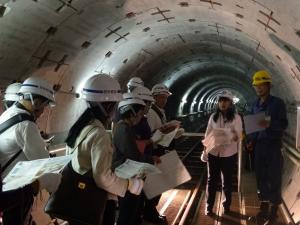 Date: 17-28 June 2013
Date: 17-28 June 2013
Place: Aichi and Gifu, Japan
Upon the request of the Strategy and Evaluation Development of Bangkok Metropolitan Administration (BMA), UNCRD conducted a special training course from 17 to 28 June in Nagoya, Japan. This course was specifically designed for the needs of BMA, taking into account the current condition in Bangkok. The training course was offered to 10 mid- and senior-level policy and planning analysts of Strategy and Evaluation Department of BMA, with all the cost born by the requesting entity.
Objectives
The main objective of the course was to provide participants with prerequisite knowledge and skills in formulating, implementing, evaluation, and monitoring an integrated set of urban development policies and measures required to build a green economy in the context of sustainable urban development.
Course Contents
In consideration of the emerging issues and problems facing Bangkok, the Special Training Course on Sustainable Urbanization for BMA will examine integrated approaches to meet the challenge of the green economy and unprecedented urbanization. The curriculum comprised of essential elements for promoting sustainable urban development, including greening the urban economy, environmentally sustainable transport (EST), 3Rs, disaster risk reduction, local resource assessment and utilization for sustainable livelihood.
The BMA policy and planning analysts visited Nagoya City Government to learn and discuss with officials about the Basic Environment Plan as well as flood control measures of the city. The curriculum also included field study visits to Toyota City, which is developing a smart city together with the private sector, notably Toyota Motor Corporation; Gifu City for a collaborative approach between the community and the City Government for disaster risk reduction; and Gujo City for an example of community-led initiative for the improvement of living environment utilizing local resources; and a local retail company for its efforts with consumers and recycling manufacturers to create a recycling-oriented society.
Outputs
At the wrap-up session, BMA analysts thoroughly discussed what they had learned from the Special Training Course and examined the applicability in the context of sustainable development for Bangkok. Then, they came up with two action plans: one is an environmental plan with a focus on waste management and disaster risk reduction and the other is an economic plan on tourism and green economy. These action plans were also submitted to the Director of the BMA Training and Development Institute as final outputs. Finally, these plans were also reflected in the master plan "Bangkok Vision 2032: Vibrant of Asia," which was formulated by the Strategy and Evaluation Department of BMA and was lunched in the beginning of 2014. BMA has expressed an interest in continuing to provide training to its officials in collaboration with UNCRD.
Evaluation
Judging from the results of the course evaluation questionnaire, the majority of participants was in agreement that the curriculum prepared by UNCRD responded to their expectation and needs and the main objective was achieved. UNCRD also highly appreciated their active participation throughout the course, and in fact they gained much more than what we had prepared. BMA has shown interest in continuing to provide training to its officials in collaboration with UNCRD.

